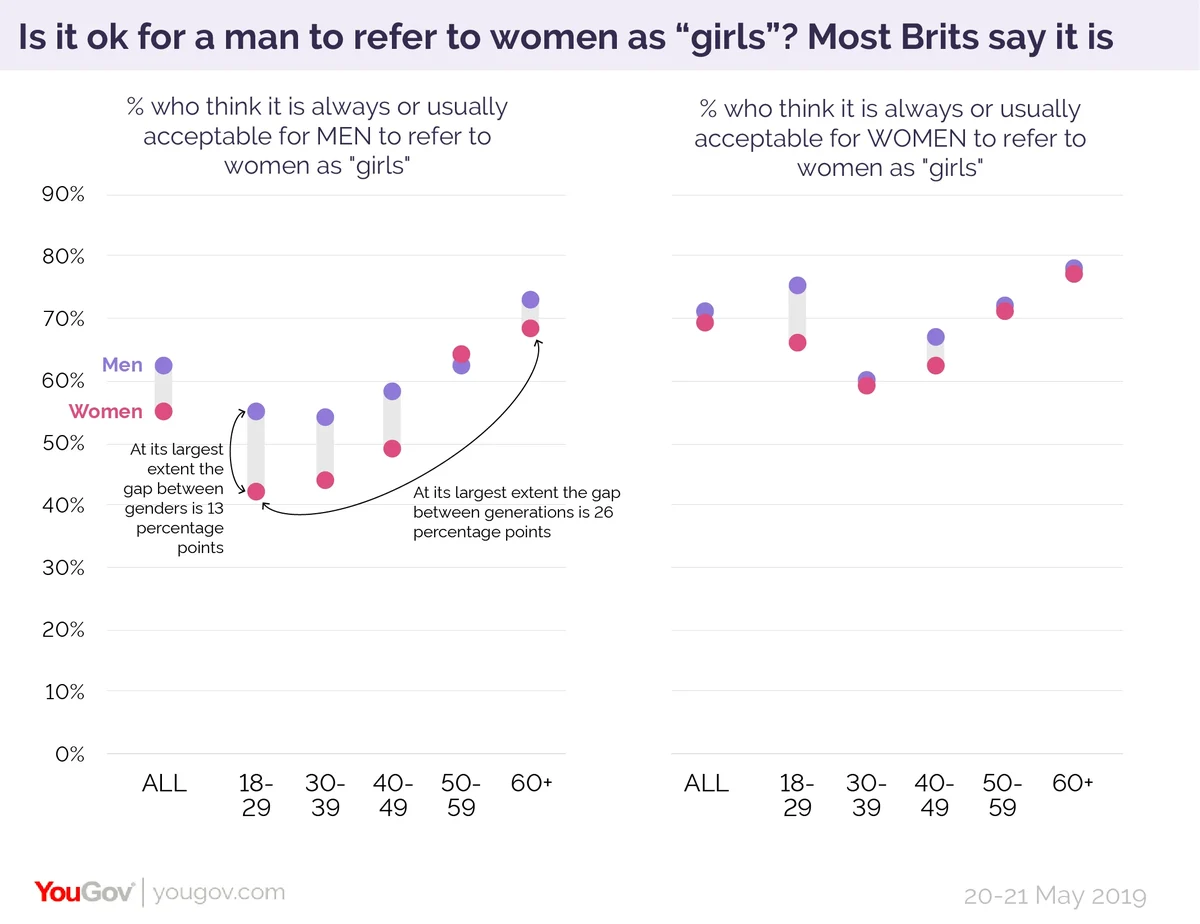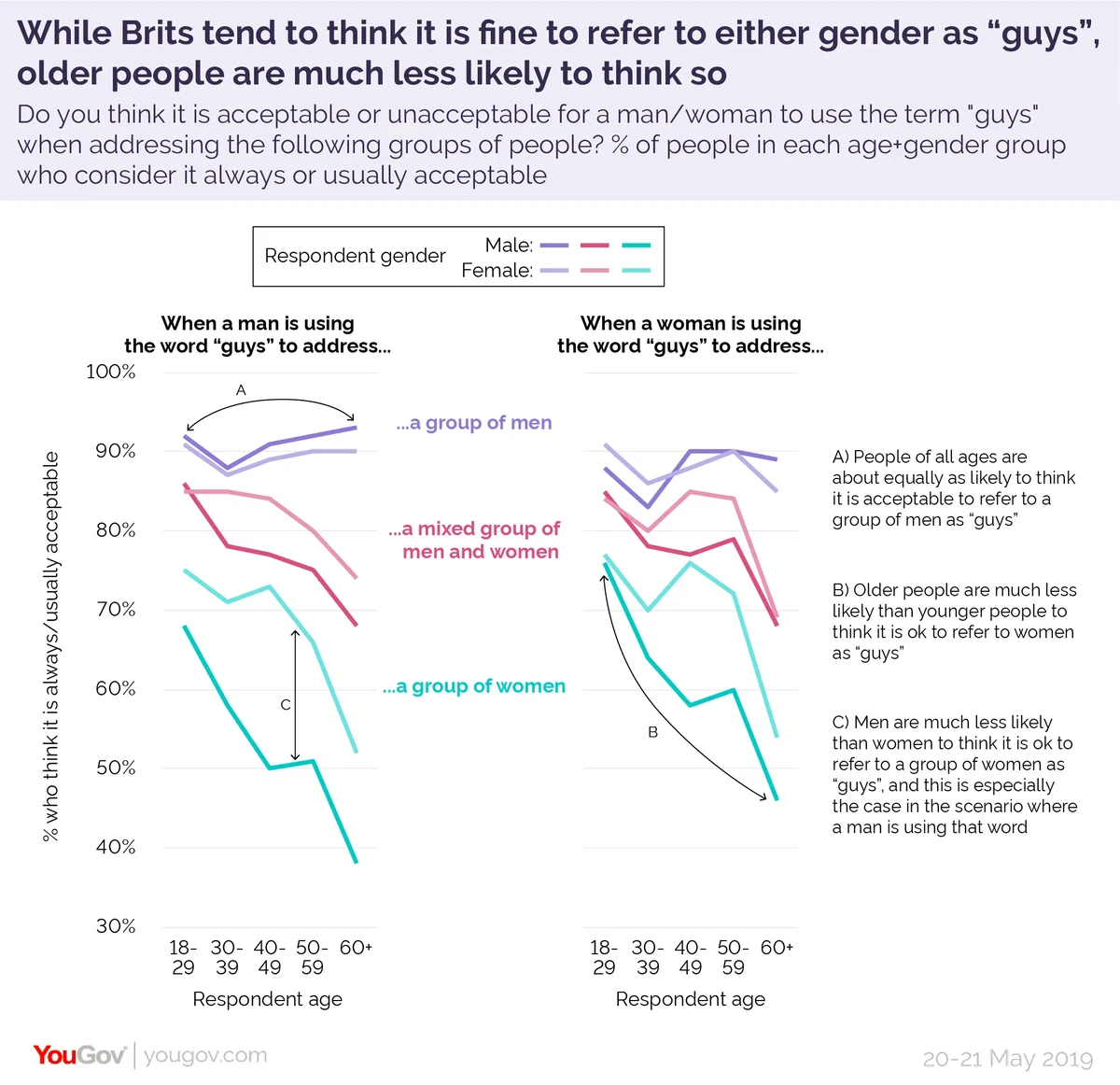Most Britons think it is, but calling men “boys” is far more accepted, and using “guys” to refer to mixed groups is widely seen as inoffensive
Every once in a while a public figure, generally a man, refers to grown women as “girls”. In doing so they stoke the embers of an ongoing argument over whether such a term is acceptable.
Critics of using the word this way say that it’s patronising or sexually suggestive. But new YouGov Realtime data shows that most Britons see it as acceptable language, whether from a man or a woman.
A majority of Britons (58%) think it is always or usually acceptable for men to refer to women as “girls”. This figure includes most women (55%), but a larger number of men (62%). Only 20% of men and 33% of women think it is usually or always unacceptable.
The biggest difference is not between genders, but rather between generations. While 70% of people aged 60 and over think it is acceptable language, this falls to only 48% among those aged from 18 to 24. A generational gap of this magnitude is present among both men and women.

Despite the generational differences, amongst almost all age groups people are more likely to think it is generally ok for a man to call women “girls” than not. The only exception is among women aged from 18 to 29, and even here the 44% of women who think it is usually or always unacceptable is within the margin of error of the 42% who think it is generally acceptable.
When it comes to women referring to their peers as girls, Britons are more accepting still, and differences between the genders and generations disappear or become more muddled.
Overall 70% of Britons think it is always or usually acceptable for women to refer to one another as girls. Men and women are about equally likely to feel this way at 71% and 69% respectively.
When it comes to age differences, the trend whereby older people are more accepting is present from ages 30 and up, but is bucked by the fact that people aged from 18 to 29 are noticeably more likely to think the terminology is acceptable.
Boys, ladies and guys
Our data shows that referring to men as “boys” doesn’t hold the same negative connotations. Almost three quarters (72%) of Britons think it is generally ok for men to refer to each other as boys, and 68% say it is fine when women use the term. In both cases, women are less likely to feel using the term is appropriate (76% versus 68% if a man were saying it, and 73% versus 63% if a woman were doing so).
The term “ladies” has also come in for criticism, and was seen by feminists in the 1960s and 1970s as objectionable. Nevertheless, today the word is widely accepted, with fully 85% of Britons saying it is not offensive for women to refer to one another as ladies, and 83% viewing it as acceptable for men to do so. In fact, half of the population consider it to “always” be ok to use the term, whether a man or woman is using it.
There are also objections to the way people use the word “guys” to refer to both genders, given the term has previously been used to refer to men only.
Nevertheless, the results reveal that Britons tend to think it is ok to refer to either gender as “guys”, although people are noticeably more accepting of using that term when it comes to men. While between 88% and 90% of Britons are happy for someone to address a group of men as “guys”, this falls to 78% if that word were used to address a mixed group of men and women, and down to between 59% and 63% for a group of women only.
Again, age plays a key role. While Britons of all ages are all roughly as happy for “guys” to be used on a group of men, older Britons are substantially less likely to be ok with it being used to refer to a group containing women.

For instance, while 72% of 18 to 29 year olds think it is acceptable for a man to refer to a group of women as “guys”, this figure falls to just 46% among those aged 60 and over.
And in the case where someone is referring to a group of women as “guys”, men are noticeably less likely to think it is ok than women of the same age: for instance, while 71% of women in their 30s think this is ok, only 58% of men in their 30s say the same.
Photo: Getty






